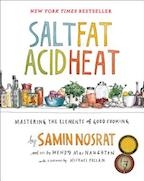
As part of The A.V. Club’s best of the 2010s coverage, we asked some of our favorite authors to share their 10 favorite books of the decade. Next up is Bryan Washington. Washington’s debut, Lot, a collection of linked short stories set in Houston, traces the coming of age of a young gay man, the son of a Black mother and Latino father. In The A.V. Club’s review, Rien Fertel writes, “Lot manages to squeeze a whole world of cultural, political, and social issues into the macro-microcosm that is the place nicknamed Space City: racism, poverty, violence, drugs, gentrification, AIDS, the War On Terror, and anti-immigrant conservatism.” Washington has also written lovingly and astutely about food and its intersection with race, class, and queerness for publications like The New Yorker and BuzzFeed. This year he was named a National Book Foundation 5 Under 35 honoree. Here, in his own words, are his favorite books of the 2010s.
Longthroat Memoirs: Soups, Sex And Nigerian Taste Buds by Yemisi Aribisala (2016, Cassava Republic)
I’ve never read food writing like Aribisala’s. She altered what I thought a meal could look like on the page.
My Brother’s Husband by Gengoroh Tagame (trans. by Anne Ishii, 2017, Pantheon)
Tagame shifted how I see narrative on the whole, let alone art in general, and this series was a delight and a marvel. I love it so much.
Tell Me How It Ends: An Essay In 40 Questions by Valeria Luiselli (2017, Coffee House Press)
For about a year, all I did was buy this book to give to everyone within arm’s reach.
Strange Weather In Tokyo by Hiromi Kawakami (trans. by Allison Markin Powell, 2017, Counterpoint Press)
I love this book and its characters so much. It’s the best.
They Can’t Kill Us Until They Kill Us by Hanif Abdurraqib (2017, Two Dollar Radio)
Abdurraqib is just phenomenal. I don’t know what else to tell you. These sentences make me feel how I feel watching Simone Biles on a vault, or Shoma Uno on the ice, or anyone who is just impossibly fucking stellar at whatever they’re doing.
Pachinko by Min Jin Lee (2017, Grand Central Publishing)
If Pachinko were the last book I could ever read and return to, I’d be cool with that. It contains whole worlds. Worlds!
What Is Not Yours Is Not Yours by Helen Oyeyemi (2016, Riverhead)
Oyeyemi just does everything better.
On Earth We’re Briefly Gorgeous by Ocean Vuong (2019, Penguin Press)
I have literally never read a more beautiful book, no cap.
Life On Mars by Tracy K. Smith (2011, Graywolf)
I wasn’t a reader by any stretch of the imagination, and then a friend gave me a copy of this book. Smith’s poems spent years floating around in my head, reorganizing how I thought, and what about, and why.
Salt, Fat, Acid, Heat by Samin Nosrat (illustrated by Wendy MacNaughton, 2017, Simon & Schuster)
This book changed how I thought about cooking, and it changed how I thought about eating. Then it changed how I thought about teaching and learning. It changed what I thought a table could look like, and why. Imagine being as amazing as Samin Nosrat.
9 Comments
Huh, I was thinking of borrowing a book by Oyeyemi from the library and her short story collection was favored by both Mr. Washington and Ms. Cottrell. I’ll check it out over the winter break.
I haven’t read her stories, but I’ll vouch for Mr. Fox. (I also read Boy, Snow, Bird which wasn’t as good.)
I looked up “Boy, Snow, Bird” on a search engine. Articles and reviews have called it problematic in handling gender and trauma. Is that what factored to your dislike or is there more to it?
I can see that view, but I personally tend to not be bothered by “problematic” books (I can still enjoy books even if they imply a worldview I don’t agree with, or contain things that would be disturbing in real life). My issue was more just that, while I think there were some interesting ideas present, the novel seemed more burdened by them than enriched by them. Whereas Mr. Fox was a lot more interesting in structure and concept, but was also exhilirating on a page-by-page basis.
You mean, On Earth We’re Briefly Gorgeous was a real book? I only know of it from this brilliant clickhole article: https://www.clickhole.com/shameful-salman-rushdie-used-his-blurb-for-this-young-1835587888
Arghhhhhhhhhhh!!!!!!!!!!!!!!!!!!! Can I tell you most politely that I hate you😘? I’ve only read 4 of your top 10 books and so my tbr list grows ever taller😂😂.
Finished Pachinko. I have a bunch of Luiselli titles TBR.
That’s one of mine too. Also, “Life in Mars”, “Tell Me How it Ends” and ” Salt, Fat, Acid, Heat” 😉
This post is good, your work is very nice, you are read more information than open this link: http://www.learntutorialspoint.com/